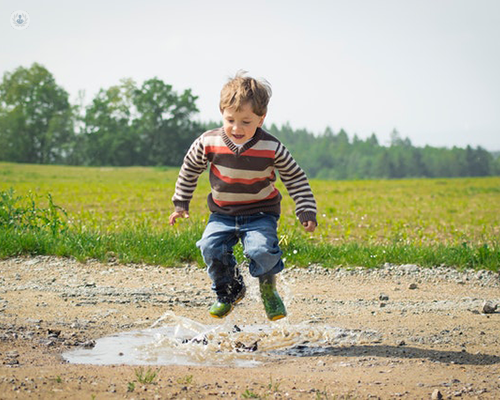An expert guide to urinary incontinence in children
Escrito por:A loss of bladder control, also known as enuresis, can disrupt a child’s daily activities and may also cause them embarrassment. Although young children commonly have occasional accidents, a change in how well they can control their bladder during the day or at night time as well as problems that persist after the age of five may indicate a bladder condition that requires medical attention. In this informative article, renowned consultant paediatrician Dr David Shortland offers advice and guidance for parents on bladder issues in children including possible causes and when to see a doctor.

What is enuresis?
Enuresis is a loss of bladder control. This can refer to day or night time urinary problems. Usually, children will have normal bladder control by three years of age during the day and at night most children are dry by the age of five. Daytime urinary incontinence symptoms are usually treated in children over the age of three to four years of age and at night over the age of six.
What are the main symptoms and causes?
The most common cause of daytime urinary incontinence is detrusor instability. In this condition children need to pass urine frequently. They have urge incontinence and if they are not able to get to the toilet in time they will be incontinent. At night, the symptom would be wetting the bed after an age when a child would be expected to be dry.
In the majority of cases, there is no underlying, significant kidney or bladder problem but it is important to consider whether the symptom may point to an underlying medical problem. In the first instance, it is essential to decide whether a child has a high urine output state. This can be caused by conditions such as kidney problems or diabetes. In this situation children pass urine frequently and also pass large amounts of urine. A medical history, examination and urinalysis should identify this sub-group of children.
In the majority of cases, however, children seem to pass the normal amount of urine during a twenty-four hour period at frequent intervals and if they are not able to get to the toilet in time, they become incontinent. This condition often results from an increased bladder "tone" and treatments are aimed at relaxing the bladder so that urine is passed less frequently.
In primary nocturnal enuresis (where children have always wet the bed at night), it is highly unlikely that there will be an underlying kidney or bladder problem. In cases of secondary enuresis, however, (where children have been dry but subsequently wet the bed at night), the clinician needs to be aware that this can be due to an underlying medical disorder and investigations should be arranged.
Most children are dry at night from the age of five. The majority of these children will gradually gain nocturnal control and treatment is not, therefore, essential but treatment can be offered from the age of five to six years of age to try to improve bladder control at night.
When should parents be concerned about their child’s enuresis symptoms?
Most children will have normal bladder control during the day at around the age of three years of age. Beyond this age children who have bladder problems, such as frequency of passing urine or urinary incontinence, should seek medical advice to see if there may be an underlying medical disorder and to consider whether medical treatments would be helpful in controlling these symptoms. Children who have nocturnal enuresis beyond the age of five to six years may also look for treatments to try to help with the symptoms.
How is the cause of bladder problems diagnosed in children?
For children with daytime urinary infrequency or incontinence, it is important to decide whether there may be an underlying bladder or kidney problem. A thorough medical history and examination should be performed. This should be supplemented with investigations including a urine test to see if there is evidence of diabetes or other kidney disorders.
A renal ultrasound scan is also generally requested where there is daytime urinary symptoms. In primary nocturnal enuresis, investigations are not usually performed. In cases of secondary enuresis (where the child has previously been dry at night), investigations should be performed and these would include a urinalysis and a renal tract ultrasound scan.
How can bladder problems develop if left untreated?
For the majority of children who have daytime urinary symptoms, the problem will resolve spontaneously. The symptoms are often transient. Bladder "instability" can follow from a urinary tract infection. If there is evidence of an underlying kidney or bladder problem, investigations and specific treatment should be offered.
For the majority of children who have daytime urinary symptoms, there is no underlying kidney or bladder problem and treatment can be offered to try to stabilise the bladder so the child regains normal bladder control and the urinary incontinence resolves. In the first instance, treatment is usually offered for three to six months and then withdrawn.
Nocturnal enuresis generally causes less disruption to the child's life and wellbeing and treatment is very much up to the discretion of the family. It is usually offered after the age of six years. There are various treatment approaches. An enuresis alarm can be helpful. The alarm can be bought from online providers but it is generally better for the alarm to be provided through health providers so that appropriate training and supervision can be offered.
There are also behavioural techniques such as bladder training and lifting that some families can find helpful. There are also medications that can be very successful in treating nocturnal enuresis. Medications such as Desmopressin can be offered and can achieve a success rate in over fifty per cent of children. Treatment is generally offered for around a three month period initially. There are also other medications which can be used in addition to Desmopressin when this medication has not been successful alone.
If you are concerned about your child’s bladder problems and wish to book a consultation with Dr Shortland, don’t hesitate to visit his Top Doctors profile.


